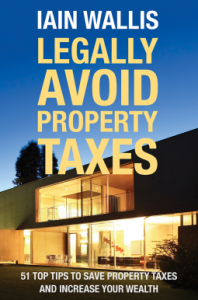Whew! I didn’t know UK had so many taxes, even a Tobacco and drinking tax! But then when the state pays for your health, I guess you need a little nudge to stay healthy. Well not everyone smokes or drinks . . . But most of us do buy a property or hope to buy one in our lifetime. Legally Avoid Property Taxes: 51 Top Tips to Save Property Taxes and Increase Your Wealth is a book you should read at least once before you take a plunge in the real estate world.
Although the book is written exclusively for the people in UK, I am sure other countries too have similar tax structures related to property – I believe it is quite similar in India: what with the Indian government thinking about adding Inheritance tax to burden the affluent a bit more.
Iain Wallis has had a 30 year long career as a Chartered Accountant and works with high net worth individuals to save them thousands of pounds in taxes. He is also a property investor and manages property investments for many clients.
 Legally Avoid Property Taxes: 51 Top Tips to Save Property Taxes and Increase your Wealth
Legally Avoid Property Taxes: 51 Top Tips to Save Property Taxes and Increase your Wealth
Author: IAIN Wallis
ISBN 1783012366
Book Review
The book is organized according to the audience. For example, a property investor can quickly look at the Avoiding Taxes in a Property Investment Business chapter, whereas a property trader can move directly to the Avoiding Taxes in a Property Trading Business section. And even if you are just a regular one-house-in-a-lifetime buyer, you can still be haunted by Capital Gains Tax and Inheritance Tax. The author has individual chapters dedicated to these big ones.
Does doing all this manipulation mean that you are evading taxes? Are you duping the government? The author believes that it is only appropriate to use the rules that tax to also be used for saving tax. The key is to stay within the boundaries of the rules. In Chapter 2, Tax Avoidance and Tax Evasion, the author explains the distinction between Tax Evasion and Tax Avoidance and clears your doubts about the legality of his tips.
If you don’t know whether you are a property investor or a property trader, the author explains the difference between the two and the most important tax and cost consideration for both these profiles. Along with the tax treatment for your profile, the book is full of advice for a first-time property buyer.
The author also explains the tricky differences in different types of expenditure and what can be used to claim deductions with simple real-world examples. For instance, he explains that replacing the rundown part of the property won’t be deductible; however, fixing that part of the property is considered as expense and hence, deductible.
I will say that Legally Avoid Property Taxes is a good resource to understand the different taxes involved in buying and selling property. For people who wish to enter the real-estate world as investors or as a traders, this book can be a good primer to acquaint yourself with the cost of trade and know what steps you need to take before the transaction and during the time you have the property on your hands. The book is easy to follow an nothing like the nightmarish tax manual you have attempted to decipher.
